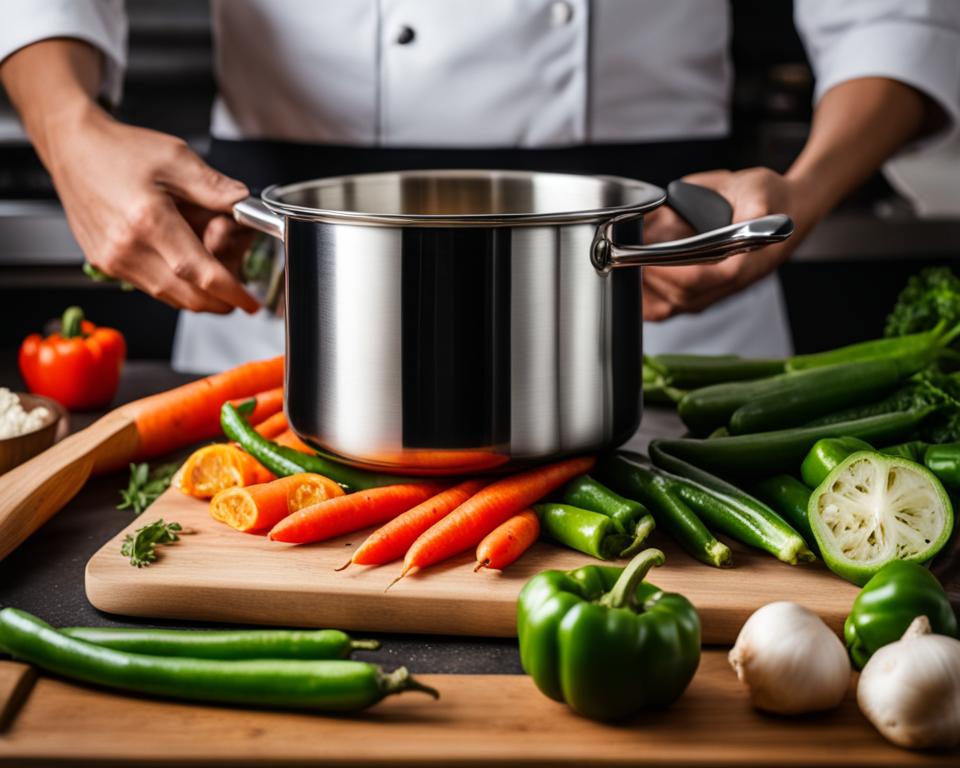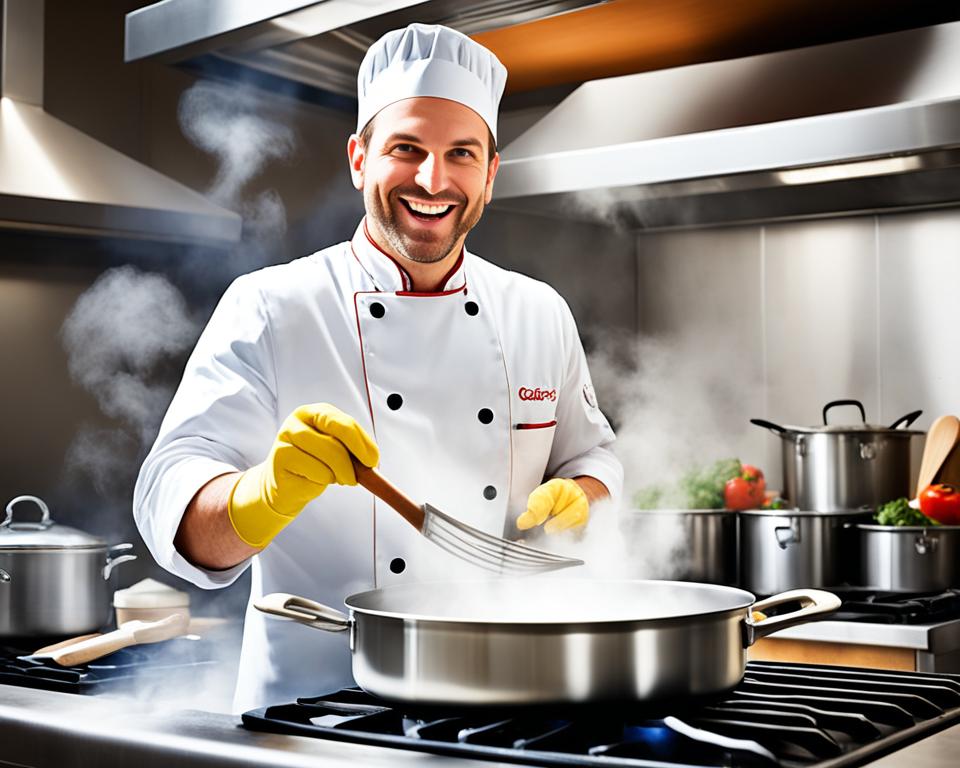Introduction
Aluminum cookware is a popular choice for many home cooks because it is lightweight, durable, and affordable. However, there is some concern about the safety of using aluminum cookware, as some studies have linked aluminum exposure to health problems such as Alzheimer’s disease and kidney damage.
In this article, we will discuss the safety of using aluminum cookware, as well as the benefits and drawbacks of using this type of cookware. We will also provide tips for cleaning and storing aluminum cookware to help you reduce your exposure to aluminum.
Benefits of using aluminum cookware
Aluminum cookware is a popular choice for many cooks because it is lightweight, durable, and conducts heat evenly. Additionally, aluminum cookware is relatively inexpensive, making it a good option for budget-minded cooks.
Here are some of the benefits of using aluminum cookware:
* Lightweight: Aluminum cookware is one of the lightest types of cookware available, making it easy to maneuver and store.
* Durable: Aluminum cookware is also very durable and can withstand years of use.
* Even heat distribution: Aluminum cookware heats up quickly and evenly, which helps to prevent food from burning.
* Inexpensive: Aluminum cookware is relatively inexpensive, making it a good option for budget-minded cooks.
III. Safety precautions for using aluminum cookware
Aluminum cookware is generally considered to be safe to use, but there are a few safety precautions that you should take to avoid any potential risks.
First, avoid using aluminum cookware with acidic foods, such as tomatoes, citrus fruits, and vinegar. These foods can react with the aluminum and release aluminum ions into the food, which can be harmful if consumed in large amounts.
Second, do not cook acidic foods in aluminum cookware for long periods of time. The longer the food is cooked, the more aluminum ions will be released into the food.
Third, avoid using aluminum cookware if you have a history of kidney disease. Aluminum can accumulate in the kidneys and can damage kidney function.
Finally, if you are concerned about the safety of using aluminum cookware, you can choose to use a different type of cookware, such as stainless steel or cast iron.
Safety precautions for using aluminum cookware
When used properly, aluminum cookware is safe to use. However, there are a few safety precautions that you should take to avoid any potential risks.
- Do not use aluminum cookware to cook acidic foods, such as tomatoes, citrus fruits, or vinegar. This can cause the aluminum to leach into the food, which can lead to health problems.
- Do not use aluminum cookware on high heat. This can cause the aluminum to warp or melt, which can be dangerous.
- Do not use aluminum cookware with non-stick coatings. The non-stick coating can release harmful chemicals when heated, which can also be dangerous.
- Wash aluminum cookware thoroughly after each use. This will help to remove any food residue that could potentially cause the aluminum to leach into the food.
How to store aluminum cookware
Aluminum cookware can be stored in a variety of ways, but the most important thing is to keep it dry and free from moisture. Here are a few tips for storing aluminum cookware:
* **Store aluminum cookware in a dry place.** This could be in a cabinet, pantry, or other storage area that is not exposed to moisture.
* **Do not stack aluminum cookware.** Stacking aluminum cookware can cause the pots and pans to scratch each other, which can damage the non-stick coating.
* **Use a protective liner.** If you are storing aluminum cookware in a cabinet or other enclosed space, you can place a protective liner between the pots and pans to prevent them from scratching each other.
* **Wipe down aluminum cookware before storing it.** This will help to remove any food residue or grease that could attract pests or bacteria.
* **Do not store aluminum cookware in direct sunlight.** Sunlight can cause the aluminum to oxidize, which can discolor the cookware and make it more difficult to clean.
By following these tips, you can help to keep your aluminum cookware in good condition and extend its lifespan.
VI. Common problems with aluminum cookware
There are a few common problems that can occur with aluminum cookware. These include:
- Aluminum can react with acidic foods, such as tomatoes and citrus fruits, and cause them to taste metallic.
- Aluminum can leach into food, especially when it is cooked at high temperatures. This can lead to health concerns, such as Alzheimer’s disease.
- Aluminum cookware can be scratched easily, which can make it difficult to clean.
- Aluminum cookware can warp if it is heated unevenly.
To avoid these problems, it is important to use aluminum cookware correctly. Here are a few tips:
- Avoid cooking acidic foods in aluminum cookware.
- Use a non-stick cooking spray or oil to prevent food from sticking to the pan.
- Wash aluminum cookware with a mild detergent and warm water.
- Do not use abrasive cleaners or scouring pads on aluminum cookware.
By following these tips, you can help to prevent problems with your aluminum cookware.
How to avoid problems with aluminum cookware
There are a few things you can do to avoid problems with aluminum cookware:
- Don’t use abrasive cleaners or scouring pads on aluminum cookware. This can damage the surface of the cookware and make it more likely to leach aluminum into your food.
- Don’t cook acidic foods in aluminum cookware for long periods of time. Acidic foods, such as tomatoes, can react with the aluminum and cause it to leach into your food.
- Don’t use aluminum cookware to cook acidic foods at high temperatures. This can also cause the aluminum to leach into your food.
- Avoid using aluminum cookware if you have a history of kidney problems. Aluminum can be harmful to people with kidney problems.
By following these tips, you can help to avoid problems with aluminum cookware.
Tips for choosing aluminum cookware
VIII. Tips for choosing aluminum cookware
When choosing aluminum cookware, there are a few things to keep in mind.
- **Consider the thickness of the aluminum.** The thicker the aluminum, the more heat evenly it will distribute and the longer it will retain heat. This can be important for preventing food from burning or sticking to the pan.
- **Choose a non-stick coating.** A non-stick coating can help to prevent food from sticking to the pan, making it easier to clean.
- **Look for a durable construction.** Aluminum cookware should be made from a sturdy material that will not warp or crack over time.
- **Choose a size that is right for you.** Aluminum cookware comes in a variety of sizes, so you can choose the one that is best suited for your needs.
By following these tips, you can choose aluminum cookware that will meet your needs and provide you with years of use.
Where to buy aluminum cookware
Aluminum cookware can be purchased at a variety of stores, including:
- Grocery stores
- Department stores
- Hardware stores
- Online retailers
When shopping for aluminum cookware, it is important to consider the following factors:
- The size and shape of the cookware
- The material of the cookware
- The non-stick coating
- The price
It is also important to read the reviews of the cookware before purchasing it to make sure that other consumers have had a positive experience with it.
Here are some tips for choosing aluminum cookware:
- Choose cookware that is the right size and shape for your needs.
- Choose cookware that is made from high-quality aluminum.
- Choose cookware that has a non-stick coating that is durable and easy to clean.
- Choose cookware that is affordable.
Aluminum cookware is a versatile and affordable option for cooking. By following these tips, you can find the perfect aluminum cookware for your kitchen.


